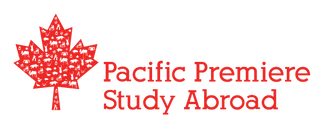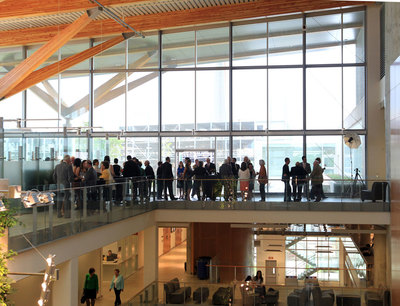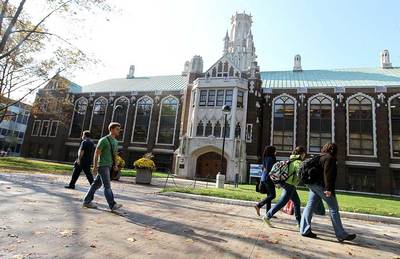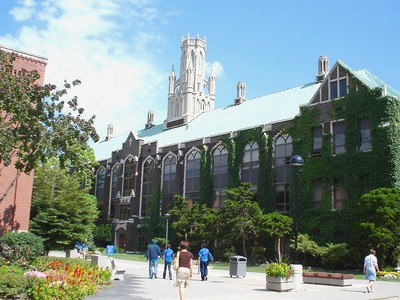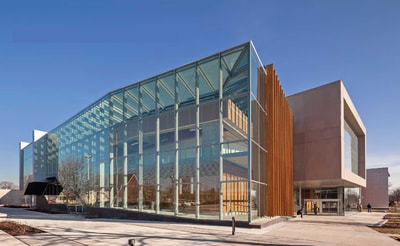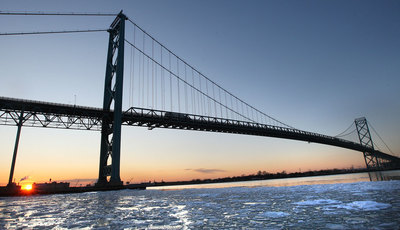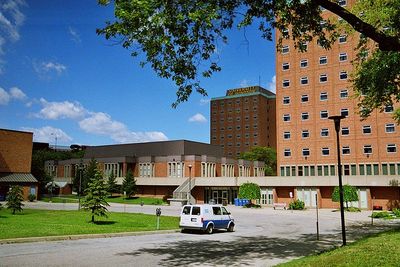โปรแกรม Bachelor of Applied Science in
Mechanical Engineering
สถาบัน University of Windsor
(เมือง Windsor, รัฐ Ontario)
About University of Windsor
มหาวิทยาลัยวินเซอร์เป็นมหาวิทยาลัยรัฐชั้นนำของประเทศแคนาดา ได้ถูกก่อตั้งในปี 1857 ในนาม Assumption College และ ได้ก่อตั้งเป็นมหาวิทยาลัยวินเซอร์ในปี 1962
- สถาบันตั้งอยู่ใจกลางเมืองวินเซอร์
- เพียง 3 ชั่วโมงจากเมืองโตรอนโต้
- สถาบันติดกับแม่น้ำ Detriot River และ เขตเมือง Windsor Detriot Metropolitan area เพียงข้ามสะพานจะถึงประเทศสหรัฐอเมริกา ถือว่าที่ตั้งเหมาะเป็นอย่างยิ่งสำหรับท่านที่สนใจที่จะศึกษา พร้อมหาประสบการณ์ในประเทศแคนาดา และ สหรัฐอเมริกา
Why choose University of Windsor?
- มหาวิทยาลัยวินเซอร์มีชื่อเสียง และ คุณภาพการศึกษาดีเยี่ยม (High Academic Excellence)
- คณาจารย์ และ นักศึกษามาจากทั่วโลก (Truly international)
- หลากหลายโปรแกรมที่น่าสนใจในระดับ ปริญญาตรี ปริญญาโท และ ปริญญาเอก
- หลากหลายสาขาการเรียน
- ได้สัมผัสทั้งประเทศแคนาดา และ ประเทศอเมริกา ซึ่งห่างเพียงไม่กี่นาทีข้ามสะพาน Ambassador bridge (Enjoy the best of both worlds, Canada & USA)
- สามารถทำงานระหว่างเรียนได้ 20 hours/ week
- สามารถทำงานหลังเรียนจบอย่างถูกต้องตามกฎหมาย
Program Details
Mechanical Engineering includes two broad areas of study: thermofluids (which involves heat and power) and solid mechanics (designing mechanical parts, determining the forces on those parts during operation, and analyzing their performance as part of larger machines and systems.)
Provides the opportunity to design, produce and operate the mechanical systems that move us, comfort us and make our lives better.
Courses:
1. Students must have completed at least eight (8) of the ten 1st year courses before being allowed to register into 2nd year courses, including all prerequisite courses required for registration into 2nd year courses.
2. Students must have completed all 1st year courses and at least ten (10) of the twelve 2nd year courses before being allowed to register into 3rd year courses, including all prerequisite courses required for registration into 3rd year courses.
3. Students must have completed all 1st and 2nd year courses and at least ten of the twelve 3rd year courses before being allowed to register into 4th year courses, including all prerequisite courses required for registration into 4th year courses.
4. Taking courses out of sequence can be allowed at the discretion of the Department Head.
92-210. Dynamics
Review of kinetics and kinematics of particles; work-energy and impulse-momentum methods; moments of inertia of areas and masses; kinematics of rigid bodies; plane motion; forces and accelerations for rigid bodies, energy and momentum methods for rigid bodies in plane motion. (Prerequisite: 85-111 or 64-140) (3 lecture, 2 tutorial hours a week.)
92-311. Stress Analysis
Analysis of stresses and strains in simple mechanical structures subjected to combinations of axial, torsion and flexural loads; two-dimensional transformations of stress and strain components; yield and fracture criteria; deflection of statically determinate and indeterminate beams; buckling of columns with various end conditions; introduction to energy methods. (Prerequisite: 85-218.) (3 lecture, 2 laboratory/tutorial hours a week.)
92-317. Applied Thermodynamics
Ideal gas mixtures and psychrometrics. Reacting mixtures and combustion. Power cycles, refrigeration and heat pump cycles. (Prerequisite: 85-212.) (3 lecture, 2 laboratory/tutorial hours a week.) 92-320. Fluid Mechanics II Navier-Stokes equations and some exact solutions, external flows boundary layer over a flat plate, drag forces; turbulent flows in pipes and mixing length theory, flow measurement, compressible flows and introduction to potential flows. (Prerequisite: 85-233.) (3 lecture, 2 laboratory/tutorial hours a week.)
92-321. Control Theory
Control system concepts, linear modelling and analysis of response and stability of physical systems, complex variables and Laplace transforms, frequency, and transient response analysis and performance specifications. (Prerequisites: 62-215 and 62-216.) (3 lecture hours, 1 tutorial hour a week.)
92-323. Machine Dynamics
Linkages of flexible connectors, cams, toothed gearing, intermittent motion mechanisms, trains of mechanisms, static and dynamic analysis of mechanical flywheels, balancing of rotating and reciprocating masses. (Prerequisite: 92-210.) (3 lecture, 2 tutorial hours a week.)
92-324. Engineering Measurements
Basic concepts in instrumentation; error analysis; instrumentation and measurement systems including sensors, transducer, signal conditioning and display; microcomputer-based data acquisition and analysis. (Prerequisite: 85-222 or 65-205.) (3 lecture, 1.5 laboratory/tutorial hours a week.) 92-328. Heat Transfer Introduction to the three heat transfer modes: conduction, convection, and radiation. Application of heat exchange equipment.(Prerequisite: 62-216 and semester 6 or higher standing.) (3 lecture, 2 laboratory hours a week.)
92-400. Capstone Design
Student design teams, operating within a "company" environment, utilize the broad range of their undergraduate experience in interdisciplinary projects selected to promote interaction between the mechanical, automotive, and materials programs. Design methodologies and team interaction simulate future professional practice. Project milestones include: a design proposal with cost analysis and scheduling, construction and commissioning of the designed appartus, and a final report and presentation having both global and detail completeness. (Prerequisite: Semester 7 or higher standing.) (2 semester course.)
92-411. Design for Failure Prevention
Philosophy of machine design. Design factor/reliability relationships. Contemporary fatigue analysis, including low- and high-cycle, triaxial state of non-reversed stress and fatigue damage, with applications of selected mechanical elements. (Prerequisites: 92-311, 92-323, and Semester 7 or higher standing.) (3 lecture, 3 laboratory hours a week.)
92-418. Thermofluid Systems Design
Evaluation of major thermofluid systems: HVACandR, power generation. Factors affecting design and selection of thermofluid devices: boilers, pumps and compressors, valves, piping systems, heat exchangers, evaporators, and turbines. Effect of device characteristics on process efficiency. Application of optimization techniques to thermofluid systems. (Prerequisites: 85-212, 85-233, 92-328; and either 92-317 or 92-320.)
92-421. Machine Design
Gearing and gear trains: spur, helical, worm, and bevel gears. Clutches, brakes, couplings, flywheels. Chain and belt drives. Design of shafting. Student-developed software to support mechanical design. (Prerequisite: 92-323 and 92-311.) (3 lecture, 3 laboratory hours a week.) 92-459. Computer Aided Engineering - CAE Three-dimensional graphics; fundamentals of finite element methods for problem solving in heat transfer, solids, and trusses using finite element computer programs. (Prerequisite: 92-311.) (2 lecture, 3 laboratory/tutorial hours a week.)
MECHANICAL: APPROVED COURSES TO FULFILL NON-SPECIFIED ENGINEERING COURSE REQUIREMENTS
Some of these courses may not be offered in any given year.
92-315. Mechanical Vibrations
Free, damped, and forced vibration of single and multi-degree of freedom systems with discrete masses. Exact and approximate methods of solution. Vibration isolation, vibration transducers, use of computers in vibration analysis. (Prerequisite: 92-210 and Semester 6 or higher standing.) (3 lecture, 2 tutorial hours a week.)
92-412. Mechatronics
Review of electromechanical components. Practical application of microcontrollers in electromechanical systems. Use of infrared sensors, photoresistors, operational amplifiers, timers, servomotors, and analog/digital converters in mechatronics systems. A hands-on, laboratory-based course.(Prerequisite: Semester 7 or 8 standing for Mechanical Engineering students; other students require instructor approval.) (2 lecture, 3 laboratory/tutorial hours a week.)
92-428. Sustainability in Engineering
Environmental impact assessment. Biophysical and socioeconomic impacts from engineering activities, processes, and projects. Human health and environmental risk concepts. Introduction to life cycle analysis, corporate/industrial environmental management, and environmental management systems. Students will undertake various project related and problem-based assignments. (Cross-listed as 93-428.) (Prerequisite: 85-250 and Semester 6 or higher standing.) (3 lecture, 2 tutorial hours a week.)
92-440. Topics in Mechanical Engineering
Selected topics of current interest in Mechanical Engineering. (Prerequisite: 4th-year Semester 7 or higher standing or permission of instructor.) (3 lecture, 1 laboratory hour a week.)
92-441. Directed Studies in Mechanical Engineering
A special course of studies in Mechanical Engineering with content and direction approved by the Department Head. (Prerequisite: Semester 7 or higher standing with a 70% average or better.)
92-450. Gas Dynamics
Basic concepts and one-dimensional flow equations of gas dynamics. Emphasis on isentropic flows in variable area ducts as well as Fanno, Rayleigh and Isothermal flows in constant area ducts. Normal shock waves, their appearance in various flow types, their application in nozzles and diffusers. Oblique shock and Prandtl Meyer expansion waves. Considerations in compressible flow measurements. (Prerequisite: 92-320.) (3 lecture, 1 laboratory/tutorial hours a week.)
92-451. Turbomachines
Dimensional analysis and similitude; definitions of efficiency, two dimensional analysis of axial flow turbines and compressors, three dimensional flow, centrifugal pumps and compressors. (Prerequisite: 92-320.) (3 lecture, 1 laboratory/tutorial hours a week.)
92-453. Heating, Ventilation, and Air Conditioning
Principles of environmental air quality and occupant comfort control. Psychrometric analysis of buildings as applied to common air distribution system designs. Current solar radiation estimation techniques and other energy transfer mechanisms; their application to cooling and heating load calculations. Analytical and numerical calculations. Computational tools. (Prerequisite: 92-317.) (3 lecture, 1 laboratory/tutorial hours a week.)
92-455. Environmental Effects and Control of Noise
Physical properties of sound and noise, measurement of noise, noise control, hearing characteristics and environmental effects of noise. (Prerequisite: Semester 7 or higher standing.) (3 lecture, 1 tutorial/laboratory hours a week.)
Career Tracks:
- State-of-the-art manufacturing and production
- Business
- Government
- Systems design/operation/building/maintenance
- Consulting
- Transportation
- Pollution control and prevention
- Advanced computing and communications
- Medicine and medical technology
- Bio-based engineering
- Research and development
- Structural design
- Failure analysis
- Construction and infrastructure renewal
- Scheduling and optimization
- Automotive industry
- Environmental protection
- Project, process and systems management
- Robotics and advanced electronics
- Power generation and distribution
Admission Requirements:
ENG4U, MHF4U, SCH4U and SPH4U required. MCV4U strongly recommended. 74% average in all attempted Science and Math courses, excluding SBI4U. Students may apply for optional Co-op when applying for admission to the program.
Contact Us
หากน้อง ๆ หรือคุณพ่อคุณแม่มีคำถาม หรือสนใจรับโบรชัวร์ สามารถแจ้งได้ที่
ออฟฟิศแปซิฟิคสาขากรุงเทพฯ
(083) 358-7000, (086) 881-3084, (085) 658-7000
ออฟฟิศแปซิฟิคสาขาแวนคูเวอร์
(778) 995-4763, (604) 716-0478
พี่ ๆ ทีมงานยินดีพร้อมประสานงานและบริการการสมัครวีซ่าประเทศแคนาดาและวีซ่าอเมริกาอย่างครบวงจรค่ะ นอกจากนี้จะมีทีมงานต้อนรับและศูนย์แปซิฟิคสาขาเมืองแวนคูเวอร์ค่ะ
